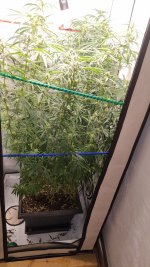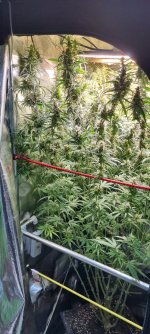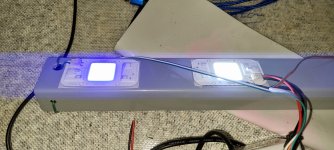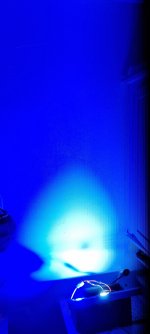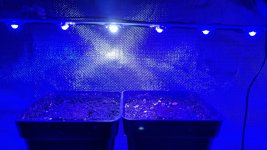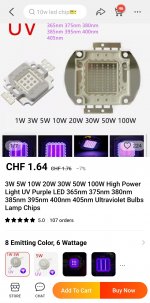-
ICMag with help from Phlizon, Landrace Warden and The Vault is running a NEW contest for Christmas! You can check it here. Prizes are: full spectrum led light, seeds & forum premium access. Come join in!
You are using an out of date browser. It may not display this or other websites correctly.
You should upgrade or use an alternative browser.
You should upgrade or use an alternative browser.
LED and BUD QUALITY
- Thread starter Tropical Sun
- Start date
Hah-ha ..yea, i didn’t mean anything by that. I think it’s just important to point out cause the resin swells up way more in hydro/coco than in soil.Why do you like to wake demons up haha
That is one frosty male, i think the trichomes on him are better then some fem led grows ive seen
I've seen some proper resin glands on few males that i bloomed before but not nearly as many as on that one.
You can actually smoke test males too. That Taskenti was the male that got me to try it but it works with less frosty males also. THC-weak males you might not feel after smoking but when the strain is averaging around 15-20% thc on the females, you will/should get a mild effect out of the males too .
It’s well worth to try if you’re into seed making projects/breeding.
Don’t smoke the sunleaves – smoke the tops- all the material you see on the photos i just posted; dry them out shake off the pollen, brake up the thin young stems into small bits and the smaller/waterleaves and mix these with the flower material.
3-4 large bong hits for me and then i sit back to analyze the mild effect. The smoke isn’t harsh cause there’s not alot of chlorophyll in the male flowers – it’s much more smoother than smoking sunleaves.
The effect is mild so it’s better that it’s your first smoke of the day – and maybe not right after you wake up and had a heavy smoking session last night - but you do get an effect with all the nuances included just like with females. Of course the effect is a lot milder cause there’s not alot of resin on male-flowers but it’s noticeable enough to use it as a selection tool in breeding projects.
Cerathule
Well-known member
@snakedope
I'm attaching a review about photo-protectants in C. sativa (which seems to include terps as well, but not conventional sunscreen pigments)

I'm attaching a review about photo-protectants in C. sativa (which seems to include terps as well, but not conventional sunscreen pigments)
Attachments
Cerathule
Well-known member
any exotic monochromatic wavelengths they got?Just stumbled upon some pics of the dobs chips I talked sbout...
View attachment 18741380 View attachment 18741381
And smaller i use for seedlings sometimes ( 10k kelvin and blue).
Shall improve rooting and avoid stretching.
View attachment 18741382
or broadband blue would also be nice
ledo
Chasing the Present
I spent extensive time in the 2010’s studying UV; I’ve got detailed old posts in here @ and still have probably a thousand bucks in meters @…..@snakedope
I'm attaching a review about photo-protectants in C. sativa (which seems to include terps as well, but not conventional sunscreen pigments)
View attachment 18741392
Back then & still hold true today; you really want to get UV you go Fluoro, period… Legit UV LED burn themselves out; and it’s very hard to find unprotected MH these days still, you can but hard and the bulbs are aquarium focused or are swag ass Hort bulbs I’d never burn in an open fixture…or in my home
UVB is where it’s at, where’s it’s always been at… the LED space markets & gimmicks like a mofo and their UV claims are as bad as it gets….
The best available bulb to the public I ever found was USHIO UVB mid range, 306nm peak… at 2 feet the UVI is like 150, yup 150… Before I start get called a liar etc, go learn some shit about UV and it’s accumulating nature and it check my posts in here with meters proving it…
Anyhow I’m not gonna sleuth @ for where & cheapest you can find them but you can and I assure you these are real deal… from 3-4’ away a couple hours a day plenty..
UV’s have plenty of Pros AND Cons, never forget that….
Here’s the Spectral Graph - if you search old posts I have @ UV I’ve dumped a LOT of literature in here on this
UVB 306nm MidRange - look at that peak then overlap the Vitamin D synthesis curve - let your lightbulbs go off…
The same things we crave, reptiles etc, so do plants… I grew up with Psoriasis so know a lot about lighting & photovoltaic treatment, luckily my psoriasis long gone but knowledge not… UVA is horrible for people, plants etc… UVB has all the good stuff….. go look into medical research, they’ve known it long time too
Peace
Last edited:
ledo
Chasing the Present
Thank you - NLD / Sativa Synonyms - Yes@led05 my respect!.
No question, you know how it works.
Are you mostly in Sativa ? They look like. I wish I had enough height like you. I have to stuff them into tents. Thanks to led this works.
View attachment 18741344 View attachment 18741345
Cerathule
Well-known member
UVB is far more photoinhibitive and destructive than UVA. Not saying now one can take over the function of the other, and both of it is bad if you go overboard with it. The sun has way more UVA than UVB so plants have learned ways to deal with it, and studies show, a moderate dose can be beneficial. As it is ok to have UVA alongside of UVB for the photo-repair effect (D1 protein novosynthesis)UVA is horrible for people, plants etc… UVB has all the good stuff…..
ledo
Chasing the Present
That’s just not true; go read up some medical journals in UV for treatment of many skin issues, you’ll learn clearly it’s the UVA causing cancers, aging etc…I realize we’re dealing with plants but often learning about things were limited to studies we can accessUVB is far more photoinhibitive and destructive than UVA. Not saying now one can take over the function of the other, and both of it is bad if you go overboard with it. The sun has way more UVA than UVB so plants have learned ways to deal with it, and studies show, a moderate dose can be beneficial. As it is ok to have UVA alongside of UVB for the photo-repair effect (D1 protein novosynthesis)
UVA penetrates deep & ruins, the UVB is more surface, and though stronger / higher energy it’s good for us and you KNOW when it’s doing harm, you feel & see it the UVA much less so…
There is extensive disinformation out there @ this and a lot of it is in fact funded by the UVA tanning bed industries…
I don’t expect anyone to but if you spent a week or two looking into it you’d realize I know exactly what I’m talking about…
we want 280-320nm then 380nm - 850nm or so to get decent FR & IR too
The 400-700nm PAR range or whatever is total hogwash swag nonsense, plants love a lot more than just that….
Decades of research & hands on experimentation got me there fwiw, thousands of hours
I never dealt with UV, and im not in the field of speculation, ive read a lot about it, still very hard to draw a conclusion.
I know this means nothing, as its from picturs, and i dont remember if Snipp said it or someone else, maybe zack, but the real test is in the smoking, anyway from seeing lots of lots of pics of MH and CMH grows it does look like theres something about UV.
I know this means nothing, as its from picturs, and i dont remember if Snipp said it or someone else, maybe zack, but the real test is in the smoking, anyway from seeing lots of lots of pics of MH and CMH grows it does look like theres something about UV.
From my own experience I can say, that I grow up in the swiss mountains and the plants we had were really frosty like there was snow on them. At around 1400- 1800 meters with short summers and intenser UV radiation than in lower regions. It was already then told us its due to the higher sun / UV intensity.
Some studies also say it is important for flowering and production of resin.
Same for infrared, it also has some benefits. Dont remember what exactly.
Full spectrum FS led usually contain a small amount of both.
Even if it does not help, it wil not harm the plants.
As for UVC - you can use it to desinfect. For example when cleaning the tent put in a light for 20 minutes. Or if you have bugs (or germs, for mold not so effective) a few minutes daily will kill them without harmong your plants too much. But not intended for long time usage
Some studies also say it is important for flowering and production of resin.
Same for infrared, it also has some benefits. Dont remember what exactly.
Full spectrum FS led usually contain a small amount of both.
Even if it does not help, it wil not harm the plants.
As for UVC - you can use it to desinfect. For example when cleaning the tent put in a light for 20 minutes. Or if you have bugs (or germs, for mold not so effective) a few minutes daily will kill them without harmong your plants too much. But not intended for long time usage
Last edited:
Cannabis doesn’t produce resin only to protect itself from intense light, thou i’m sure part of the reason is to preventdehydration(edit: should have wrote effects. but it also includes dehydration) caused by sunlight, heat but also wind.
[....]
Many compounds in cannabis actually have antibacterial,antiviral and antifungal properties = to protect the plant from these kinds of environmental factors. These types of compounds wouldn’t exist if resin would only be produced against light stress.
When insects bite holes into the plant’s tissue these “scars” will open a paths to pathogens and so the plant needs to protect itself against these by producing the various compounds that are in cannabis resin.
Part of the defense mechanism of sticky resin, i would think, is so that insects wouldn’t want land on the buds. ..but that’s just me speculating.
Some plants give me skin irritation when my arm brushes a blooming plant, some more than others, and insects/animals could also feel it when they brush against a cannabis plant.
From the paper @Cerathule just posted.
Cheers for that one, mate. Seems to have alot of interesting info, haven’t read all of it yet. I’m too tired atm. Cool stuff!
https://www.icmag.com/threads/led-and-bud-quality.18123147/post-18176653
Trichomes
Trichomes form a large group of plant structures that are uni[1]or multicellular epidermal appendages, classified by their origin, form, function, and secretion (Werker, 2000). These structures are responsible for synthesis and storage of cannabinoids and terpenes in C. sativa L., accumulating in resin heads (Hudson, 1963). They protect plants from light stress (Lydon et al., 1987), high heat (Levin, 1973; Lapinjoki et al., 1991), and herbivore pressure (Pillemer and Tingey, 1976; Alahakoon et al., 2016). Other mechanisms, including water absorption through dew collection, salt secretion, and alluring function, are reported (Werker, 2000).
All aerial parts of the cannabis plant are covered with trichomes, and can be classified as either “glandular” or “non-glandular” (Dayanandan and Kaufman, 1976). Glandular trichomes contain more bioactive/psychoactive compounds than non-glandular trichomes (Raman et al., 2017; Livingston et al., 2020). Glandular trichomes are found on all anatomical plant parts except the hypocotyl and cotyledon, and non-glandular trichomes are found on stems, leaves, petioles, stipules, bract, and tepals (Raman et al., 2017).
From the paper @Cerathule just posted.
Cheers for that one, mate. Seems to have alot of interesting info, haven’t read all of it yet. I’m too tired atm. Cool stuff!
https://www.icmag.com/threads/led-and-bud-quality.18123147/post-18176653
Trichomes
Trichomes form a large group of plant structures that are uni[1]or multicellular epidermal appendages, classified by their origin, form, function, and secretion (Werker, 2000). These structures are responsible for synthesis and storage of cannabinoids and terpenes in C. sativa L., accumulating in resin heads (Hudson, 1963). They protect plants from light stress (Lydon et al., 1987), high heat (Levin, 1973; Lapinjoki et al., 1991), and herbivore pressure (Pillemer and Tingey, 1976; Alahakoon et al., 2016). Other mechanisms, including water absorption through dew collection, salt secretion, and alluring function, are reported (Werker, 2000).
All aerial parts of the cannabis plant are covered with trichomes, and can be classified as either “glandular” or “non-glandular” (Dayanandan and Kaufman, 1976). Glandular trichomes contain more bioactive/psychoactive compounds than non-glandular trichomes (Raman et al., 2017; Livingston et al., 2020). Glandular trichomes are found on all anatomical plant parts except the hypocotyl and cotyledon, and non-glandular trichomes are found on stems, leaves, petioles, stipules, bract, and tepals (Raman et al., 2017).
Science sure got it right.
I always thought that high heat has something behind it,
I saw it in the small LED tent i had, i kinda said fuck it and didnt pay much attention to it, heat was starting to rise to about 32-34c (thats what i like about LEDs, if the AC stopped working it wouldn't burn down the plants) and i didnt water it too much, the buds on it were looking more potent and frosty then my 27c LED tent, it wasent good or anything, but better in all aspects from conventinel 24-28c i had going on normally
Ever since i try to keep it at 30-31 but make sure the actual heat source (lamps) is far enough not to cause any burn, it works, they are really green and vibrant... for flowering i think maybe lower the temp but i like heat wavesss so much
EDIT
Cerathule, also thank you for this info bro, im gonna copy it to my comp, make sure i check each factor that causes them to grow grow grow big like shrooms yo
@Cerathule "THC content increased from 25 to 32% (Lydon et al., 1987), suggesting that 19 -THC was a UV-B photo-protectant"
thank you for this link, this saves me a lot of time experimenting.
i have used a 1500 watt 4000k football stadium mh light in a geodesic dome lined with reflectix. one of these with 5 horti 1k's and i noticed a large increase in visible trich coverage on a strain that i was very familiar with but i had no way to quantify chemically at the time.
this bulb came with uv warnings.
now i need to find a few screw-in uvb leds.
this thread is turning into a useful tool.
has anyone looked at the fohse A3i yet? it looks like the most state of the art light out there. a lot of options.
thank you for this link, this saves me a lot of time experimenting.
i have used a 1500 watt 4000k football stadium mh light in a geodesic dome lined with reflectix. one of these with 5 horti 1k's and i noticed a large increase in visible trich coverage on a strain that i was very familiar with but i had no way to quantify chemically at the time.
this bulb came with uv warnings.
now i need to find a few screw-in uvb leds.
this thread is turning into a useful tool.
has anyone looked at the fohse A3i yet? it looks like the most state of the art light out there. a lot of options.

